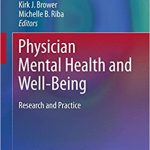Paths to Wellness in Medical Practice.
Physicians who experience an adverse event or litigation may find a wealth of evidence-based information in a new book, “Physician Mental Health and Well-Being: Research and Practice” edited by psychiatrists Kirk Brower and Michelle Riba.
Although there is little direct reference to litigation itself, this book’s 31 chapters provide an excellent resource that addresses the span of the physician’s life cycle from pre-med to retirement and focuses on:
- an extensive review of the stressors already operational in the sued physician’s environment;
- chapters on physician mental health and personality traits; and
- interventions both at the personal and organizational level.
Particularly relevant are the chapters on burnout, work-related trauma and work-life balance.
The authors note, that burnout, not a diagnosis but a syndrome, has been associated traditionally with physicians’ hard driving personality traits, long hours, and working with very sick patients. Increasingly, researchers suggest that workplace interpersonal stress is a central characteristic of burnout. Modifying such factors as lessening the burden of workplace administrative and technological demands, working in teams, and allowing physicians greater control over their work environment as well as a focus on strengthening physician wellness, may well alleviate the development of burnout.
Exposure to traumatic events is unavoidable for physicians and other healthcare workers. These may involve patients who die unexpectedly, medical errors, complications, workplace violence, as well as a host of other potential traumas. After such events, symptoms of distress – sleep disturbances, irritability, distractibility, and avoidance are common. For most persons, these symptoms resolve without intervention and with limited or no adverse effects within a period of time although a small percentage may require evaluation and psychiatric treatment.
Four sentences are devoted to the trauma associated with malpractice litigation. In evaluating the impact of any trauma, it is notable that research suggests that those individuals most directly exposed are at greatest risk for psychiatric disorders and those traumas related to intentional human action create the greatest psychological impact. Physicians involved in serious events that lead to litigation can relate to both of these findings. Litigation is focused on the highly personal assault on one’s integrity with the accusation that, “You are responsible for this tragic outcome.”
The authors suggest that measures useful to limit poor outcomes after experiencing a traumatic event include anticipatory training, leadership lending support to those physicians involved in such events, various self-help and peer support interventions as well as appropriate evaluations when indicated. Increasingly, the efficacy of mindfulness practices has a promising research base.
The last section of the book reviews suggestions and strategies for promoting wellness and outlining interventions on a personal and organizational level when symptoms of one kind or another develop. What is common to all these is the importance of the physician’s relationship to his or her self as well as with other persons. In the final analysis, George Valliant’s Harvard study underscores all these suggestions: that loving relationships, more than success, money or health, are the primary driver of a full and happy life.
